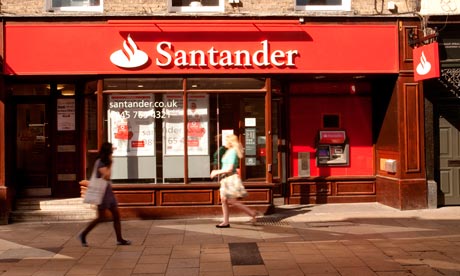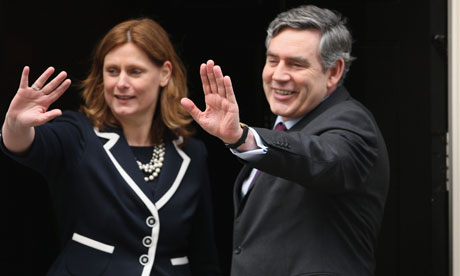There is a Little England-ism that would have us leave the EU fold. It would be a disaster

Santander: familiar on our high streets
and part of the Spanish banking system that needs bailing out
Photograph: Kumar Sriskandan / Alamy/Alamy
Taxi drivers and eminent commentators are agreed. The euro is an unmitigated disaster. It should never have been launched. Europe's elites over-reached themselves, locking the proud peoples of Europe in a disastrous straitjacket without any democratic mandate or ongoing accountability. This is payback time. Its collapse won't be pleasant, but the sooner the whole experiment is ended and Europe becomes no more than a loose association of free-trading nations with freely floating exchange rates the better. Eurosceptics have been vindicated.
This has become a settled British media and political consensus and now hardly seems the moment to challenge it. After all, Spain needs a massive bailout of its tottering banking system, including Santander, so familiar on every British high street, before the Greek election next Sunday. This appears to have been agreed yesterday. If Greece were to leave the euro before the bailout is complete, the bank run would overwhelm Spain and spread elsewhere. The EU and the IMF have only days to avoid a calamity. Southern Europe would confront run-away inflation and slump.
Nobody knows what will happen. Now Spain has got its bailout, Germany will agree to a fully fledged European banking union before the end of June, in which all eurozone countries guarantee each other's bank deposits and bank debt, agree common banking supervision and joint means to ensure every eurozone bank has sufficient capital. This should cut the poisonous link between the banking crisis and the public debt crisis. I also bet that the next Greek government will cut a deal to allow it to stay in the euro with less austerity.
In addition, a combination of ultra-cheap money and big infrastructure spending, again agreed reluctantly by Germany, across the continent will start to lift the European economy. The EU will have muddled through and the system held, because in the end the costs of break-up or for any one country exiting were just too prohibitive.
But the situation is dangerously volatile and the Germans may be too slow to act. It may be that we face months of bank runs and pandemonium and that the euro is reduced in essence to a north European euro bloc, including France and Germany but not most of southern Europe. But the big point is that one way or another the euro will have survived in some form because the member countries will have pulled together. And what will remain will be immeasurably stronger and more integrated – a euro area with a banking union, common governance of fiscal policy and political structures to match. Not a federal superstate but a new amalgam of nation states within a new international architecture – and with a newly forged European identity.
One of the byproducts of the crisis is that every European has become aware of the continent's interdependence. What happens in Greece, Spain, Ireland, France or Germany affects everyone else. Like it or not, we have to co-exist. In which case, this becomes a moment of existential choice for Britain. Eurozone members are not only fighting for the euro because the costs of collapse are so awesome. Europe must have a monetary order to underpin its ambitions to be a single market.
Devaluation, touted as a panacea across the British economic and political spectrum, certainly works for an individual country if it can devalue against others that hold their currencies stable. But as Keynes argued so effectively, if devaluation becomes the default policy for the entire system – the temptation in a world of floating exchange rates – then the consequence is disaster. It is an invitation for everyone to engage in beggar-my-neighbour economic policies by trying to rig their currency to boost their exports and minimise their imports, just as China has been doing for 30 years. A single market needs an accompanying monetary order – a heartland Keynesian proposition. This is not a doctrine of euro elites. It is how a single market can be made to work for all its peoples.
Which is why post-crisis Europe will be so tough for Britain. The EU that survives with its euro will be the centre of the European order. It will set interest rates and fiscal policy that will become the benchmark for every other European country. It will be the biggest and most desirable market in Europe and it will set the rules for how trade is conducted within its jurisdiction. Already it is happening. Senior ministers and officials have recognised that Britain had to agree to the banking union – with incalculable consequences for the City – but could do little or nothing to shape it. Financial regulation will be organised in Brussels for the benefit of euro member states. If we don't like, we can lump it. It will be across the board, from economics to climate change.
There is general delight that we are not part of this emerging superstate – a language that misrepresents what Europe is becoming. A referendum will cement our detachment or even lead to exit. Sceptics say the model for us to follow is Switzerland. The truth is that we would be a sort of Greater Guernsey, suffering an accelerated economic rundown. We will proudly float the pound, despite evidence that what floating means in practice – for a country with a huge international financial sector such as ours that sucks in capital from abroad – is systemic overvaluation and the evisceration of our traded goods sector: an economic doomsday machine.
Our foreign-owned car industry, dependent upon exports to the EU single market, will gradually migrate back to Europe or low-cost Asia. On a range of key strategic interests – finance, agriculture, fishing, transport, energy, IT and data security – benchmark policy will be made in Brussels, Paris and Berlin. They will have brought the EU through the crisis; their debts will be to each other, not us.
For the British Eurosceptic none of this counts. The vision is of endless austerity, prioritising deficit reduction above all else and evisceration of the social contract at home, and a refusal to recognise interdependence abroad or that there is any need constructively to create rules and an international order, especially in Europe. We should all resolutely tighten our belts and export our unemployment to others in a world of floating exchange rates and nonexistent international rules. It is a doctrine of arid meanness and nationalistic jingoism, an appropriate editorial line for populist centre-right newspapers, but nonsensical for a state with real interests to protect and advance. Britain stood aside from the euro crisis. It will stand even more aside from what follows, leaving us not just economically diminished but culturally shrunken.



